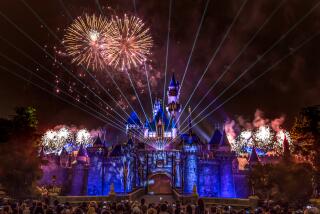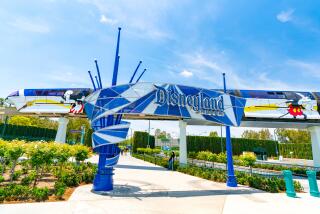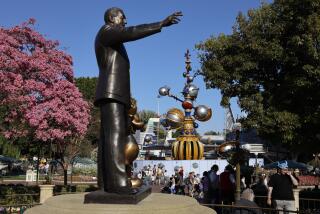Food prices at Shanghai Disneyland give early visitors heartburn
- Share via
Reporting from Beijing — Shanghai Disneyland won’t swing wide its gates to the general public until June 16, but pre-opening visitors to Walt Disney Co.’s first theme park in mainland China already have found something to complain about amid operational tests for a dazzling array of attractions: the prices, particularly for food sold in the park.
“Food in Shanghai Disney is really not cheap,” groused Cao Xinting, a 24-year-old Shanghai resident who participated in a test run on May 7, joining about 1 million visitors from all over China who are getting an early look at the park.
It’s not that Cao is strapped for cash. She works for a state-owned enterprise and her annual salary is around $15,300 — nearly double China’s gross domestic product per capita, which reached $8,000 in 2015. But Cao said she was disappointed with a latte that cost around $5.
SIGN UP for the free In the Loop theme parks newsletter >>
“It costs as much as the coffee in Starbucks, but it tasted far worse than that in Starbucks,” Cao said. “I’m fine with the pricing system of Starbucks. But for the coffee in Disneyland, it’s just not worth the price.”
On Weibo, China’s answer to Twitter, a topic titled “Shanghai Disney is too expensive” received 9 million clicks and more than 9,000 comments in early May. An article headlined “The first group of Shanghai Disneyland visitors have wept to the point of fainting inside the park, because it’s too expensive” went viral on WeChat, a Chinese messaging platform.
The article said the Shanghai soup dumplings, or xiaolongbao, were priced about $1 each in the park, which many visitors believed was too expensive. In Shanghai, xiaolongbao typically sell for about 15 cents apiece. The article also showed a receipt for a hamburger with fries and Pepsi bought at the park for about $11.50. An equivalent meal at McDonald’s costs about $5.80 in China.
Admission to the Shanghai park starts at $57 for adults, but can reach $76 during peak periods. At a news conference in Shanghai on Thursday, Shanghai Disney Resort spokesman Murray King said that tickets are the cheapest among all Disney parks around the world and affordable for middle-class Chinese consumers.
Asked about complaints regarding food and drink prices, he said that Disney had included a range of restaurant types in the park, and noted that guests can bring “commercially packaged” meals with them.
Disney spokesman David Jefferson noted Wednesday “that over 90% of the participants who have attended our trial operations period had a wonderful experience at our park, giving high ratings for everything from our attractions to our live entertainment and food and beverage offerings.”
Earlier, Fan Xiping, chief executive of Shanghai Shendi Group, which owns 57% of the Shanghai Disney resort, told the Paper, a state-run outlet, that “the test run is to listen to customers’ complaints and correct our mistakes. At the same time, it is also trying to lower public expectations.”
Yang Tianjiao, a graduate student at the Shanghai East China University of Science and Technology, said she heard about the high prices of food at Disneyland, so she brought boxed food to eat inside the park.
“I saw my friend eating lunch served by Disneyland — and a plate of rice with pork chops cost her 90 yuan” or around $14, Yang said. Her almost-identical boxed food was only about $5.
“When we dine out, 100 yuan [around $15] per person is acceptable, but the problem is that with the same amount of money, you can’t have the same good food in Shanghai Disneyland,” Yang said.
Some Web commentators denounced the grumbling about price, arguing that if you can’t afford Disney, why go there? Still, according to a survey conducted by the Shanghai Consumer Council, the less one earns, the more one is fond of Disneyland.
In the survey, more than 86% of the people whose annual income is between $7,660 and $10,700 expressed interest in the park, whereas 78% of people who earn over $15,300 a year showed fondness for Disneyland.
“The result is interesting, and beyond my expectations,” Yang Xiong, director of the Shanghai Academy of Social Sciences, said at a news conference Monday.
“People with lower income regard going to Shanghai Disneyland as a dream, so they will seize the opportunity to go the fairy-tale- and American-styled theme park at their doorstep. But for the rich, if they want to go to Disneyland, they can always go to California, Tokyo or Paris,” Hu Xingdou, professor of economics and China issues at the Beijing Institute of Technology, said in an interview.
“Disneyland is a symbol of luxury and creativity, a symbol of American culture, which is what the poorer die for,” Hu said.
The survey found strong brand awareness of Disney among Chinese consumers — more than 90% of Shanghai residents and 80% of non-locals were aware that the park will open in June. The survey included 1,880 locals and 3,500 out-of-towners.
More than 960,000 visitors have tried out Shanghai Disney so far during the test period, according to Liu Zhengyi, deputy director of the Shanghai International Tourism and Resorts Zone. King, the Disney spokesman, said more than 90,000 people visited the park on May 1, a holiday in China.
The price complaints aren’t going to keep Shanghai resident Shen Fenping, 45, from visiting the Disney park in August with her husband and son.
“I heard this park isn’t only for little kids, adults can have fun too, so I’m curious to visit,” Shen said. “Not only me, some of my colleagues at my age are also going with their husbands and children.”
Yang and Liu are special correspondents.
See the most-read stories this hour >>
MORE BUSINESS NEWS
Obamacare is helping millions get needed healthcare, new survey finds
Did a billionaire Silicon Valley investor fund Hulk Hogan’s lawsuit against Gawker?
Why Obama’s overtime rule may barely dent the economy
UPDATES:
6:47 p.m.: The article was updated to include an additional comment from Disney.
More to Read
Inside the business of entertainment
The Wide Shot brings you news, analysis and insights on everything from streaming wars to production — and what it all means for the future.
You may occasionally receive promotional content from the Los Angeles Times.










